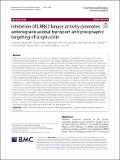Inhibition of LRRK2 kinase activity promotes anterograde axonal transport and presynaptic targeting of α-synuclein
Author(s)
Brzozowski, Charlotte F.; Hijaz, Baraa A.; Singh, Vijay; Gcwensa, Nolwazi Z.; Kelly, Kaela; Boyden, Edward S.; West, Andrew B.; Sarkar, Deblina; Volpicelli-Daley, Laura A.; ... Show more Show less
Download40478_2021_Article_1283.pdf (15.59Mb)
Publisher with Creative Commons License
Publisher with Creative Commons License
Creative Commons Attribution
Terms of use
Metadata
Show full item recordAbstract
Abstract
Pathologic inclusions composed of α-synuclein called Lewy pathology are hallmarks of Parkinson’s Disease (PD). Dominant inherited mutations in leucine rich repeat kinase 2 (LRRK2) are the most common genetic cause of PD. Lewy pathology is found in the majority of individuals with LRRK2-PD, particularly those with the G2019S-LRRK2 mutation. Lewy pathology in LRRK2-PD associates with increased non-motor symptoms such as cognitive deficits, anxiety, and orthostatic hypotension. Thus, understanding the relationship between LRRK2 and α-synuclein could be important for determining the mechanisms of non-motor symptoms. In PD models, expression of mutant LRRK2 reduces membrane localization of α-synuclein, and enhances formation of pathologic α-synuclein, particularly when synaptic activity is increased. α-Synuclein and LRRK2 both localize to the presynaptic terminal. LRRK2 plays a role in membrane traffic, including axonal transport, and therefore may influence α-synuclein synaptic localization. This study shows that LRRK2 kinase activity influences α-synuclein targeting to the presynaptic terminal. We used the selective LRRK2 kinase inhibitors, MLi-2 and PF-06685360 (PF-360) to determine the impact of reduced LRRK2 kinase activity on presynaptic localization of α-synuclein. Expansion microscopy (ExM) in primary hippocampal cultures and the mouse striatum, in vivo, was used to more precisely resolve the presynaptic localization of α-synuclein. Live imaging of axonal transport of α-synuclein-GFP was used to investigate the impact of LRRK2 kinase inhibition on α-synuclein axonal transport towards the presynaptic terminal. Reduced LRRK2 kinase activity increases α-synuclein overlap with presynaptic markers in primary neurons, and increases anterograde axonal transport of α-synuclein-GFP. In vivo, LRRK2 inhibition increases α-synuclein overlap with glutamatergic, cortico-striatal terminals, and dopaminergic nigral-striatal presynaptic terminals. The findings suggest that LRRK2 kinase activity plays a role in axonal transport, and presynaptic targeting of α-synuclein. These data provide potential mechanisms by which LRRK2-mediated perturbations of α-synuclein localization could cause pathology in both LRRK2-PD, and idiopathic PD.
Date issued
2021-11-08Department
McGovern Institute for Brain Research at MIT; Massachusetts Institute of Technology. Department of Brain and Cognitive Sciences; Howard Hughes Medical Institute; Massachusetts Institute of Technology. Media LaboratoryPublisher
BioMed Central
Citation
Acta Neuropathologica Communications. 2021 Nov 08;9(1):180
Version: Final published version